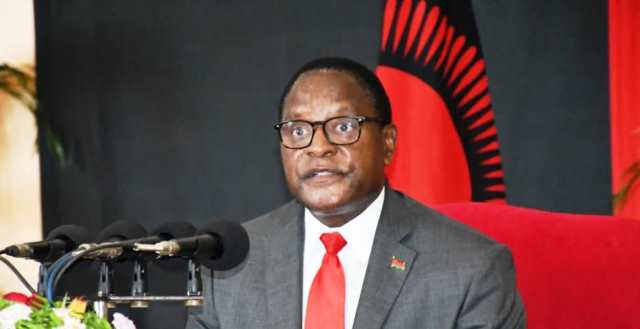LMC’S one more test
Social scientists while welcoming President Lazarus Chakwera’s dream to swiftly adjudicate “all open and past cases involving public funds’ have warned it is a daunting task requiring strong political will to succeed.
Three commentators, who also welcomed a proposal to establish a special court to expedite the adjudication of such cases, observed that political will was the key to successful investigation, prosecution and conclusion of the cases because they require adequate funding.
Chakwera’s pronouncement to swiftly adjudicate all open and past cases follows the investigative audit report that damned controlling officers and others in the public service on the usage and accountability of the K6.2 billion Covid-19 funds disbursement.
In his address to the nation a fortnight ago, the President announced that he had directed Minister of Justice and Constitutional Affairs Titus Mvalo to engage Chief Justice Andrew Nyirenda on the support required to expedite the K6.2 billion scandal as well as all open and past cases related to theft of public resources.

He also ordered Secretary to the President and Cabinet Zanga-Zanga Chikhosi to interdict without pay all officers mentioned in the audit report as having played a role in the mismanagement of the money.
His statement also came after the Malawi Law Society (MLS) asked the Judicial Service Commission (JSC) to allow it to directly engage with or impeach judges whose pace in handling cases is deemed questionable.
Presidential Press Secretary Brian Banda clarified in an interview that the adjudication will include all unconcluded cases across administrations.
Chairperson of the National Anti-Corruption Alliance Moses Mkandawire believes corruption in the country has become so pervasive and needs strong political will to deal with it.
Agreeing with Mkandawire, human rights campaigner Charles Kajoloweka observed that the long list of outstanding cases have not seen the wheels of justice because, among others, there has been no political will by all previous governments as the cases are largely also politically connected.
Social scientist Loveness Imani from the Catholic University of Malawi (Cunima) said Chakwera needed to challenge political interference in corruption cases because “most of these cases involve politicians”.
“The President should make sure that politics gets out of the way of the investigations. Priority should be on cases that will bring back the money because the government will not lose anything, but have more resources to pursue the rest of the cases.”
Political commentator Humphrey Mvula said there were several high-profile cases that require attention, having been tried and tested by various previous regimes.
“We will not heal from corruption unless all landmark corruption cases are dealt with expeditiously. Any case that involves abuse of public funds is not a small case,” he lamented.
Some open and past investigations and court cases on theft of public resources which have not been concluded include the K1.7 billion Bakili Muluzi corruption case, the K236 billion Cashgate scandal covering 2009 to 2014, the K61 billion late Bingu wa Mutharika wealth and the K14 billion transactions deleted from the International Finance Management Information System database during the 2013 Cashgate.
Others are the 20 members of Parliament (MPs) case involving mismanagement of Constituency Development Fund (CDF) in 2016, the K7.8 billion contract awarded to a suspected ghost firm, Black and Veach, for the Kam’mwamba Coal-fired Power Generation Company (KPGC) and the government pension syndicate that exposed a fake bank account with about K100 million.
There is also the K35 billion public funds that disappeared in local councils, the K354 million purportedly stolen at the Reserve Bank of Malawi, the K293 million that went missing at the Malawi Embassy in Ethiopia, the State House ghost payment for accommodation at Crossroads Hotel in Lilongwe and the K444 million fraud uncovered in several other Malawi Embassies.
The social scientists also observed that to succeed in prosecuting the cases, the Chakwera’s administration should:
l Expeditiously deal with all landmark corruption cases;
l Ensure there is judicial accountability;
l Introduce stricter policies in management of public funds; and
l Legislate laws that give strong or tougher penalties for those found guilty of corruption
Kajoloweka attributed the delays in prosecuting corruption cases to lack of judicial accountability which he said results in some cases taking long without being concluded.
“If our judiciary is not going to reform we will continue to have a big problem in fighting corruption in Malawi. We need to ensure that the Judiciary is held accountable on prosecution of these cases.
“Unfortunately, we are in a country where people think the Judiciary should not be questioned. The Judiciary is simply untouchable and unaccountable to anyone,” said Kajoloweka.
MLS honorary secretary Chrispin Ngunde called for proper conclusion of cases observing: “If the cases relating to abuse of public resources were properly concluded, it would send the right signal that fighting corruption is real in this country.”
He further noted that technical competence was not an issue in the country because many lawyers and judges were already “quite competent”.
Mvula also called for the harmonisation of key institutions involved in investigations such as the Malawi Revenue Authority, Financial Intelligence Unit, Anti-Corruption Bureau and police.
“There must be legal modalities for them to work together because most of these offences cut across these areas,” he observed.
But political scientist George Phiri observed that although Chakwera would want to expedite cases, his zeal lacks realities on the ground.
“Some cases have over stayed. Obviously, some witnesses may have died, which may make it difficult to conclude some cases objectively,” observed Phiri.
He warned the Chakwera administration to tread carefully to avoid government ending up “paying lots of money to people who stole the public resources due to lack of appropriate and convincing evidence”.





